#Attachment Style
Text
When love is unreliable and you are a child, you assume that it is the nature of love – its quality – to be unreliable. Children do not find fault with their parents until later. In the beginning the love you get is the love that sets.
Jeanette Winterson, Why Be Happy When You Could Be Normal?
#Jeanette Winterson#love#attachment style#insecure attachment#anxious attachment#avoidant attachment#attachment theory#trust#trust issues#relationship#breakup#heartbreak#recovery#healing#self awareness#personal development#personal growth#quotes
1K notes
·
View notes
Text
Utsukushii Kare master post
With Utsukushii Kare: Eternal becoming available on streaming in Japan and rumors of international streaming distribution on the horizon, I thought this might be a good time to do a roundup post of all of my meta writing on the series so far. There's quite a bit of it. Between the complexity of the psychological themes in this series and my capacity for hyperfocus, I ended up with a lot to say.
In case it doesn't go without saying, this post is subject to change as I continue to post on this topic.
The psychological paradoxes of Utsukushii Kare
This is a series of posts (the current plan is to write three installments) about what it says on the tin: paradoxical psychological dynamics in Utsukushii Kare. These are things about the characters that may seem contradictory at first but can be accounted for by digging deeper into some psychological concepts. These posts are focused on the series (both seasons) but will draw from the movie and from the novel and related stories when they illustrate points about the series.
Part 1: Covert grandiosity and finding status through idealization - A pretty deep dive into 1) the subtle ways Hira shows that while his self-image can be highly negative in some ways, in other respects he feels superior to others and 2) how by elevating Kiyoi’s status and humbling himself in comparison, Hira attains a different kind of status.
An addendum of sorts to part 1: Hira's parents and his self-defeating tendencies - Some guesswork about how Hira's parents could have contributed to his self-defeating personality, with some further discussion of specific self-defeating strategies he uses in his relationship with Kiyoi and elsewhere.
Utsukushii Kare through the lens of pursuer-distancer dynamics and related psychological concepts:
The pursuer-distancer dyad & how it applies to the world of BL - a primer on this psychological concept and how it applies to BL generally, with a brief reference to how this concept applies to Utsukare (also touches on Semantic Error and talks in detail about an example from To My Star 2). This one isn't super focused on Utsukushii Kare but is pretty de rigeur for understanding my UK posts on this topic.
Paradoxical roles; or, I think I finally figured out the pursuer-distancer dynamic in Utsukushii Kare - This post comes after some of the posts listed below but I recommend reading it first as this is really where (I think) I cracked the code on this aspect of the story.
Pursuer-distancer roles & attachment style in Utsukushii Kare, Part 1: Hira - In-depth discussion of Hira's role in the pursuer-distancer dyad, his attachment style, and his personality
Pursuer-distancer roles and attachment style in Utsukushii Kare Part 2: Kiyoi - In-depth discussion of Kiyoi's role in the pursuer-distancer dyad, his attachment style, and his personality
Re-evaluating pursuing & distancing in Utsukushii Kare season 1 - super detailed post working out my thoughts about pursuing and distancing in season 1
On the way Sakai Mai (the series' director) uses seme left, uke right framing and its significance in BL and other Japanese media:
Using an example from the s2e1 with the girl who hits on Hira at a party (via a reblog of a gifset from @nanons)
On the way Sakai flips Hira's and Kiyoi's position in the frame in two versions of the same scene and what it tells us about its significance
How the persistent/cute trope plays out in Utsukushii Kare season 2, plus related overanalyses of the big season 2 finale kiss:
The persistent and the cute (how "persistent" and "cute" are code words with specific meanings in BL/yaoi/other drama and manga genres/Japanese culture more broadly)
Analyzing the season 2 finale kiss in light of seme left/uke right framing and the persistent/cute trope (in a reblog of a gif post by @nanons)
Reblogging @bl-bracket to lobby for the season 2 finale kiss, with more overanalysis
Fragrance nerd discussion:
This bittersweet fragrance - on the significance of osmanthus/tea olive in Utsukushii Kare season 2, with additional information on the possible significance of the fragrance of osmanthus and perfumes that are either osmanthus soliflores or feature prominent osmanthus notes
Posts on specific season 2 episodes:
initial thoughts about S2e1
Additional (informal) thoughts on s2e1
S2e1 rundown
Hira's incongruous/misaligned affect at the end of s2e1
S2e2 rundown
on S2e2, including pursuer-distancer dynamics and seme left, uke right
Utsukushii Kare S2E4: “face me straight on” (mostly discussing relationship dynamics pointed out in topic-specific metas)
on Utsukushii Kare: Eternal:
Kiyoi and Anna: on Kiyoi’s friendship with Anna and its significance for his personal growth
#utsukushii kare#utsukushii kare meta#utsukushii kare analysis#utsukushii kare season 1#utsukushii kare season 2#utsukushii kare 2#utsukushii kare eternal#utsukushii kare: eternal#hira x kiyoi#japanese bl#jbl#my beautiful man#psychology of bl#pursuer distancer dynamic#attachment theory#attachment style
184 notes
·
View notes
Text
PLEASE
Complete this test for my masters thesis. It takes only 5 minutes. Thank you so much.
Please reblog and share if you can
#psych#psychology#therapy#signal boost#please boost#secure attachment#attachment style#love#relationships#relationship
46 notes
·
View notes
Photo
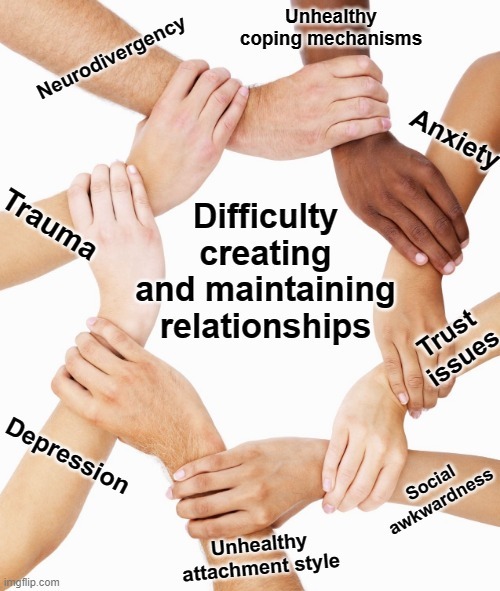
#funny#humor#coping#meme#memes#neurodivergent#coping mechanisms#lol#depression#trauma#attachment style#anxious attachment#avoidant attachment#fearful avoidant#social anxiety#social awkwardness#socially awkward#anxiety#unhealthy coping mechanisms#drinking#addiction#ptsd#ctpsd#trust issues#depression memes#anxiety memes#social anxiety memes#ptsd memes#cptsd memes#attachment memes
472 notes
·
View notes
Photo

trauma is generational || [x]
#miscent#trauma#generational trauma#prose#poetry#avoidant#avoidant attachment#attachment style#fear#fearful avoidant#anxious attachment#excerpt#excerpt from a book i'll never write#love#i love you#love po#spilled ink#poetblr#poet blog
384 notes
·
View notes
Text
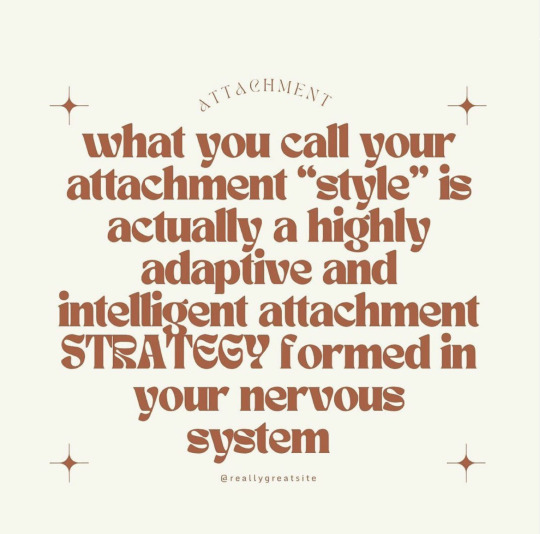
24 notes
·
View notes
Photo

#emotional permeance#love#borderline#borderline personality#borderline personality disorder#personality#personality disorder#disorder#black and white#black and white thinking#splitting#split#borderline split#depression#anxiety#anxious attachment#attachment style#attachment styles#bpd
240 notes
·
View notes
Text
typology blogs, i wuv u /p and i want to interact w u!!! bcz im into typology!!!!?
#typology#cognitive functions#jungian#socionics#attitundal psyche#enneagram#tritype#instictual variant#temperaments#attachment style#trauma response#big 5#global 5#motives#hexaco#jungian archetypes#moral alignment#ipersonic#psychosophy
4 notes
·
View notes
Note
Hello MBTI-Notes. How can I start new relationships without expecting them to grow deeper and longer? I have this problem where whenever I meet someone with similar tastes and interests as mine, I find myself imagining a friendship/romance and expecting to be a priority in that person's life, which is a bad thing because it makes me needy and desperate for attention.
1) Expectations: The expectations are just the symptom, not the root of the matter. Problematic expectations come out of the deeper issue of living in fantasy or having a distorted view of reality. No matter how hard you try to adjust your thinking, you cannot achieve realistic expectations as long as you refuse to see reality (unhealthy Ni).
Why do people choose to live in fantasy? Usually it's because they prefer it to the "harshness" of reality. In other words, they can't handle negativity and/or unpredictability, so they retreat into their own version of reality where there's no negativity and they control everything.
According to the psychology of habitual behavior, you won't be able to stop any kind of bad habit as long as you are:
unwilling to give up the gains/benefits that you derive from it and,
willfully ignoring the negative consequences that arise from it.
An easy example to understand is addiction. It's hard to break an addiction because the "high" you obtain is a chance to experience pleasure and mentally escape from life's intractable problems. This gain/benefit is too compelling for addicts to give up, even in the face of self-destruction.
In the same vein, are you willing to give up the gains/benefits of your "addiction" to living in fantasy? Firstly, you have to be aware of what they are, so list them. Secondly, you have to finally realize that those "gains" or "benefits" are actually false and harming you and not worth chasing. Thirdly and most importantly, you have to place more value on the real gains/benefits of breaking the habit and replacing it with a better one.
Reflect: What do you have to gain by being more realistic in your approach to relationships? Do you really want those gains (more than the gains of fantasy)? Are you willing to work for those gains?
2) Neediness: Another aspect of your question is desperate/needy behavior. This might be an indication that there's something off about your approach to relationships. We all need love. The need for love comes from a positive and constructive place of building a meaningful life. Neediness, however, is different, because it comes from a negative and self-sabotaging place such as: insecurity, self-loathing, emptiness, vanity, greed, etc. You'll have to do some self-reflection to see what's really at the bottom of your neediness. It sounds like you have a desire to "merge" yourself with someone, which is a dangerous way of thinking if it means lack of boundaries and losing yourself in the process (unhealthy Fe).
In some cases, neediness can be ameliorated by nurturing independence. Do you suffer from extreme beliefs that relationships are everything or the answer to all your problems etc? Do you suffer from obsessiveness, often fixating on a person, wanting them to be everything and give you everything you want? You need to correct these kinds of faulty beliefs because they make your worldview too small, narrow, and distorted.
There are lots of things in life that are important and require your attention outside of relationships. Be a more well-rounded person by giving enough attention to every aspect of life that is important for your personal growth, rather than devoting everything to relationships. Be more flexible and open-minded so that you can see and experience all the many different kinds of relationships out there, rather than limiting yourself to just one person or one singular purpose. This will help you put relationships in the right perspective, in terms of assigning them a healthier role in your life.
In the process of making these macro level adjustments to your life, the growth you undergo will naturally make you into a more attractive and capable candidate for relationships. Wouldn't it be nice to be sought out instead of the one always seeking?
3) Education: Another thing you can do is learn about your attachment style and understand how it influences your current approach to relationships. What lessons have you learned about how to conduct relationships? Were they good lessons to learn?
The fact is most of us learn about relationships from the adults we had most contact with as children. If they were not good role models and inadvertently passed down unhealthy relationship behavior to you, then an important part of your personal growth should involve correcting those unhealthy patterns and learning healthier ones. Things like communication skills, conflict resolution skills, boundary setting, and emotional intelligence are all important things to learn and improve on if you hope to be more socially competent.
#infj#infj relationships#expectations#fantasizing#neediness#independence#attachment style#relationships#ask
29 notes
·
View notes
Text
What is dismissive avoidant
Dismissive avoidant attachment is a type of attachment style that is characterized by a fear of intimacy and a need for independence. People with dismissive avoidant attachment styles often view close relationships as a threat to their independence and self-reliance. They may also have a negative view of others, believing that they are not capable of providing emotional support. As a result, people with dismissive avoidant attachment styles often avoid close relationships or keep their partners at a distance.
There are a number of factors that can contribute to the development of dismissive avoidant attachment style, including:
Early childhood experiences: People who have experienced neglect, abandonment, or abuse in their early childhood may be more likely to develop dismissive avoidant attachment styles. These experiences can teach children that they cannot rely on others for support and that they must be self-sufficient in order to survive.
Personality traits: People who are high in neuroticism or low in agreeableness may be more likely to develop dismissive avoidant attachment styles. These personality traits can make it difficult for people to trust others and to feel comfortable in close relationships.
Life experiences: Traumatic events, such as the death of a loved one or a divorce, can also contribute to the development of dismissive avoidant attachment styles. These events can make people feel insecure and distrustful of others, which can lead them to avoid close relationships.
If you have a dismissive avoidant attachment style, there are a number of things you can do to improve your relationships. First, it is important to understand why you are afraid of intimacy and why you need so much independence. Once you understand your own attachment style, you can start to work on changing your behaviors.
Here are some tips for improving your relationships if you have a dismissive avoidant attachment style:
Challenge your negative beliefs about relationships. If you believe that close relationships are a threat to your independence or that others cannot be trusted, challenge these beliefs. Think about the evidence that supports and contradicts these beliefs.
Practice being vulnerable. Vulnerability is an essential part of close relationships. If you want to have close relationships, you need to be willing to share your thoughts and feelings with others. Start by being vulnerable with people you trust, such as close friends or family members.
Communicate your needs. If you want your partner to meet your needs, you need to communicate them clearly. Tell your partner what you need from them in terms of support, affection, and intimacy.
Be patient. Changing your attachment style takes time and effort. Don't expect to change overnight. Just keep practicing the tips above and you will eventually start to see results.
18 notes
·
View notes
Text
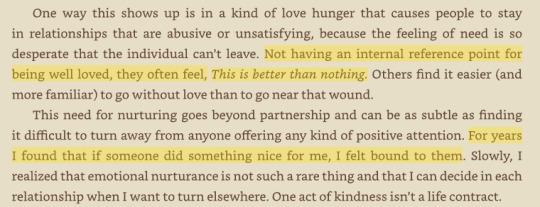
Jasmin Lee Cori, The Emotionally Absent Mother
16 notes
·
View notes
Text
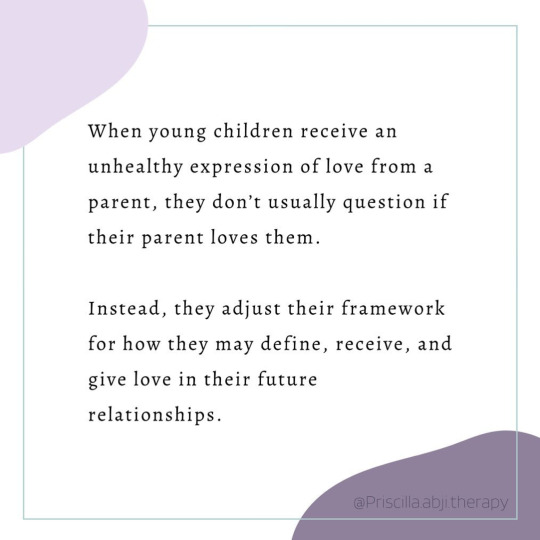
priscilla.abji.therapy ~ Instagram
#priscilla.abji.therapy#love#relationships#parenting#conditioning#attachment style#attachment theory#healthy love#unhealthy love#healthy relationships#unhealthy relationships#toxic love#healing#childhood healing#personal growth#relationship advice
147 notes
·
View notes
Text
Question: How to communicate about moving slowly in the early stages of dating?

Someone on Reddit posted recently asking this:
Hey everyone,
I've noticed when using dating apps that most people seem to move pretty quickly, at least by my standards. For example, texting at least daily (often multiple times a day) and wanting to go on dates 2-3 times per week. To me, that feels like going from 0 to 100 and it makes me stressed out. It takes me quite a while to warm up to strangers and integrate new people into my life.
I would much rather slow down at the start, and go on a date once every week or two and maybe text a couple of times per week. I'd be happy to ramp that up to daily contact and more frequent dates, but I usually reach that point after 2-3 months or so - around the time when people usually define the relationship and go exclusive.
I'm just wondering, how do I communicate this respectfully to people, without making them feel like I'm playing games, keeping it casual or just not that keen? I'm wondering, is it better to tell people directly that this is my preference, or is that overkill?! I'm FA so I tend to get anxious and overthink everything.
Here is my response:
I very much relate to your predicament about feeling overwhelmed and stressed! I've found Thais Gibson's videos on the Personal Development School about guilt and Fearful-Avoidant attachment super relevant for this issue, so I'd highly recommend checking those out! I've come to realise that I often project my own emotions and over-empathise due to enmeshment trauma.
It’s actually really important to stay centred and grounded in yourself and your own needs. People with a Fearful-Avoidant attachment style often lose touch with their own needs, boundaries and preferences while in the presence of others, so there is a need for more alone time and reflection to regulate.
My current approach is to communicate clearly, and be honest if you don’t have the bandwidth to text, call or meet up as often as they do. It’s wise to give some reassurance that it’s not personal, but you don’t have to reassure the person constantly.
It can be anxiety inducing because we worry that the other person will lose interest or feel rejected, but unfortunately I think that's a risk that we have to embrace. We won't be compatible with everyone and we can't force it.
Not to mention many people actually find a little bit of unpredictability and distance can be exciting and increase desire in relationships - Esther Perel talks a lot about this! For some people, it can actually be a feature (in moderation), rather than a bug. However, in the early stages, people may just move on if they assume the other person is not genuinely interested in them, playing games, dating others, etc. So it’s good to establish some consistency and clarity in the early dating phase.
If you communicate tactfully about needing space and are fairly consistent, I don't think the right person would view it as a major problem or dealbreaker. I know in the past when I was in a more anxiously attached headspace, I didn't mind less frequent communication if it was relatively consistent and predictable - so I knew what to expect.
You could say something along the lines of the following, to put their mind at ease:
"Hey, I generally take things slow when I’m getting to know someone, I’ve found it healthier for me to carve out alone time and friend time too”
Or
"Hey, I don't text that much, but please don't take it as a sign of disinterest because I really am interested in continuing to see you"
That said, if the person seems continually insecure or upset about your boundaries and communication frequency, you may not be compatible. Constantly reassuring someone can be stressful, so if it’s feeling excessively draining, then maybe they aren’t a good fit for you. It doesn’t mean they are a bad person or too needy - it’s just a mismatch of needs.
People with an Anxious-Preoccupied attachment style may struggle with your limits, but it doesn’t make your boundaries or limits wrong or cruel. It’s important to focus on yourself rather than focusing too much on how other people feel, as ultimately it’s not sustainable to be constantly stressing about upsetting or disappointing others.
These are the Personal Development School videos I found most relevant:
How to Ask Your Partner for Space
How To Tell Your Anxious Partner You Need Space
How to Stop Feeling Guilty About Everything
#boundaries#relationships#dating#communication#attachment#attachment style#anxious preoccupied#avoidant attachment#fearful avoidant
13 notes
·
View notes
Text
Please please mutuals help!
Hi! I need help for my masters degree investigation. . It takes less than five minutes to complete.
Eternally grateful!!!
Please click this link to complete and reblog if not
25 notes
·
View notes
Text
I WAS FRAMED!
“Enframing means the gathering together of that setting-upon which sets upon man, i.e., challenges him forth, to reveal the real, in the mode of ordering, as standing-reserve. Enframing means that way of revealing which holds sway in the essence of modern technology and which is itself nothing technological.” —Philosopher Martin Heidegger
Got that? Probably not, read it again. The notoriously…

View On WordPress
#alienation#art#Arthur Schopenhauer#artists#atman#attachment style#capitalism#dasein#ego#enframing#exchange value#happiness#heidegger#karl marx#lot in life#pair-bonding#peer-bonding#socialization#technology#will#working for a living
2 notes
·
View notes
Photo
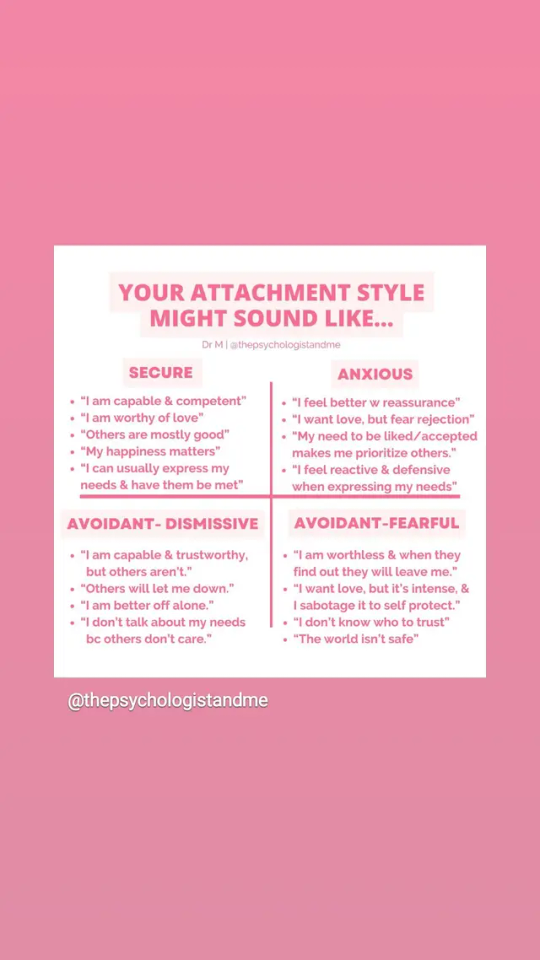
attachment style
2 notes
·
View notes